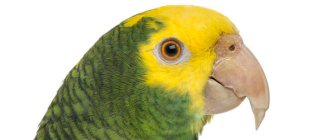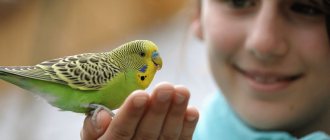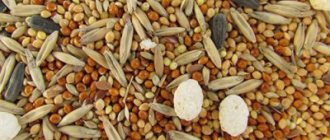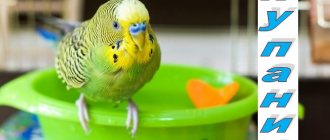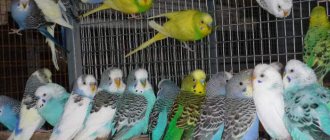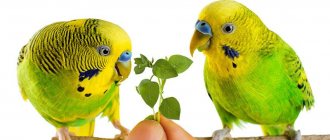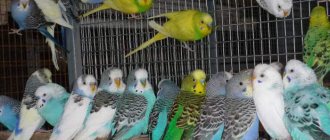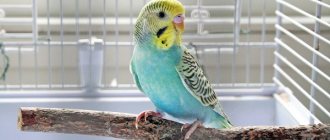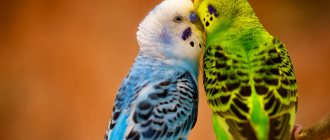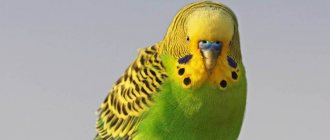Birds, unlike mammals, are much less likely to suffer from gastrointestinal problems. This is due to anatomical features: the excretory system of birds is united, all remnants of undigested food, liquid and solid, exit through the cloaca. However, constipation problems occur in budgies, which can cause serious harm to the pet and even cause its death.
Causes of constipation
If constipation occurs in a parrot, the owners themselves are to blame, since they do not provide the pet with adequate care. So, the main causes of this type of stomach upset include the following factors:
- presence of fatty foods in the diet;
- stale food or poisoning;
- long absence of water;
- unsanitary condition of the cell;
- psychological condition;
- stone or chalk.
| Causes of constipation | Why is this happening | What to do with a bird |
| Presence of fatty foods in the diet | There is an opinion that in nature parrots also feed on larvae, and not just a variety of grains. However, this is not a proven fact, and some owners believe it and prefer to feed their birds even fatty meat, since it is of animal origin. It is strictly forbidden to do this. | If you really want to feed your pet food of animal origin, then it is better to give him low-fat cottage cheese. With it, the bird will not have problems with the esophagus. |
| Stale, stale food or poisoning | A parrot, like many birds, does not understand food and does not understand what it can eat and what it cannot, so it eats everything. | Constantly monitor the quality of the food in your bird’s feeder. |
| Long absence of water | Water promotes good digestion and softening of stool. | You should constantly monitor the presence of water in the drinking bowl. Also, do not forget to change it every day and then you will not worry about constipation in your parrot. |
| Unsanitary condition of the cell | A cell contaminated with waste is a real breeding ground for pathogenic microorganisms. Therefore, failure to comply with hygiene rules increases the risk of contracting some kind of bacterial infection. | Regularly monitor the cleanliness of the cage. And once a month it would also be a good idea to disinfect it or at least wash it and all the accessories that are in it with chamomile decoction. |
| Psychological factor | Sometimes malfunctions in the intestines occur due to a change of owners. Therefore, do not be surprised if at first you observe constipation in your bird. | As soon as the bird gets used to it, problems with stool will disappear on their own. |
| Presence of chalk or stone | There are also cases that a stone or chalk that you give to your pet to scratch its beak causes it to retain stool. | If you notice that they are the cause of this kind of violation, then it is better to abandon them. |
Description of diarrhea
Diarrhea in budgies is called repeated occurrence, with watery discharge, or liquid droppings of green, bloody or gray color. It is formed as a result of a malfunction of the bird’s stomach and intestines.
Diarrhea is a consequence of the development of the disease, and not some separate disease. There are usually two gastric diseases, each of which can be a possible cause of diarrhea: we are talking about polyuria and diarrhea in a budgie.
Liquid droppings indicate that the parrot has diarrhea . If the shape of the stool remains the same, but there is watery discharge in the stool, then the pet has polyuria . These phenomena should not be ignored. The bird needs urgent treatment. Otherwise, the parrot may also develop liver and kidney diseases. The result of such a negligent attitude towards the health of a feathered pet is death. Therefore, you need to treat your budgie, and not wait for the disease to stop on its own.
When a parrot has diarrhea, its appearance and behavior change . If before your feathered friend was an active, mobile bird, now all he basically does is sit still without changing his position. At the same time, the parrot stops reacting to what is happening around, is silent, and does not want to fly. He may also begin to sleep when he was previously awake, stop eating , or eat very little food. Sometimes a bird can regurgitate food that has not been completely digested due to health problems (more precisely, with the stomach).
As for the appearance, during diarrhea the budgie has an unkempt appearance: it ruffles its feathers and ruffles its feathers . If you look closely, you will notice that your pet has an inflamed cloaca : it will have red, painful tissue and very dirty feathers near the cloaca.
Once a bird has had diarrhea for a long time, it will lose weight sharply .
You can't immediately see weight loss behind the feathers, so you need to feel the parrot. Pay special attention to the chest. There is a growth there (otherwise it is called the “keel bone”). A healthy bird has a slightly palpable bone. If the growth protrudes significantly, then your feathered pet has been sick for a long time.
Constipation in a parrot photo
Signs that your parrot needs to see a doctor
So, if the wavy’s droppings begin to blur, it has acquired a bright yellow or green color, this is a reason to keep an eye on it.
You should consult a doctor immediately if you notice the following signs:
- Instead of stool, there is only greenish liquid.
- Blood in the litter. To check this, drop hydrogen peroxide on the droppings; if there is blood, bubbles will appear.
- The bird often sits at the bottom of the cage, it is ruffled, closes its eyes, there is lethargy and apathy.
- The parrot has loose stools and does not eat anything. You notice that the cloaca is very dirty, and you also see undigested grains in the droppings.
Symptoms of constipation
It is not easy to notice that a parrot is constipated. This can only be done by a very attentive owner. First of all, changes that are associated with the color and quality of the litter should catch your eye. If there are problems with the intestines, it becomes denser and acquires a gray or light yellow color. Also, with this disorder, the bird may lose its appetite.
If constipation has been going on for quite a long time, then, taking a closer look at the bird, you will see a lot of changes. The main ones include:
- Depressed mood of the bird.
- No droppings in the cage.
- Very long intervals between bowel movements.
- Frequent attempts by the parrot to pluck a place in the cloaca area.
- The pitiful squeak of a bird.
- Presence of bloating.
If you have already noticed such changes with your pet, then it is necessary to begin treating it as quickly as possible. After all, we can no longer talk about days, but even about hours, and if you do not have time to help the bird, it will die.
Especially dangerous is litter that has acquired an orange or red color. This color indicates the presence of a bacterial infection, poisoning, and damage to the gastrointestinal tract.
Iatrogenic disease in a budgerigar
08/11/2017, 23:00, “Green Parrot Bird Hospital” < [email protected] >:
Good afternoon Point 3, Rigevidon, should be excluded from the treatment plan as it is extremely harmful to the health of your bird. Since your bird's long-term health problem is associated with the use of these medications. Since in this case we are talking about the iatrogenic nature of the parrot’s disease. It should be treated with courses of lipomin and sarcomin, 10 grains each, for 1 month. It is also better to show the parrot to our specialist from the Green Parrot bird hospital.
Sincerely, Vladimir Romanov
Saturday, August 12, 2021, 1:51 +03:00 from ko:
I live not far from Balashikha, when can I come and buy the drug and can consult with someone. Should I give Lipomin and Sarcomin together?
08/13/2017, 15:02, “Green Parrot Bird Hospital” < [email protected] >:
Anytime! from 10 a.m. to 11 p.m. on weekdays, on weekends from 10 a.m. to 8 p.m. It is better to give lipomin and sacromin separately in courses of 1 month. What is the name of the doctor who consulted you before us? Sincerely, Vladimir Romanov Sunday, August 13, 2021, 18:39 +03:00 from ko:
I was consulted remotely, on M and B the doctor is known by the nickname Zosia
I see she is trusted and recommended on many resources.
08/13/2017, 23:38, “Green Parrot Bird Hospital” < [email protected] >:
Poor birds! I would advise using the recommendations of real doctors, and not those who use nicknames and are not known as real individuals! I made a slight mistake in the name of the drug - (spelling error) - sarcomine!
Sincerely, Vladimir Romanov
Sunday, August 13, 2021, 23:50 +03:00 from ko :
It’s okay, we have at least some choice from the Moscow region, and even then there’s almost none, I’m talking about normal ornithology. And in the regions, provinces, and in general, what people say is terrible. A man with a wavy bird comes to the veterinarian; the bird’s tumor is no longer frail on its belly, like ours. And he tells him, go with God, this is a bird’s pregnancy, and the tumor was discovered six months ago. And another freak in a similar situation complained so much that he crushed everything inside, and these are real stories, here are real doctors. Here I live in the Moscow region, and even in my city they refuse to do x-rays, and I won’t bring the bird to you, she was in deep shock after a 3 km trip, she was choking with fear. So, alas, in Raska the situation with the treatment of birds is very bad.
Hold on! But by the way, bird hospitals abroad are also not located in every gateway. For example, in the United Arab Emirates in Abu Dhabi. That is, the owner has to travel hundreds of kilometers for help! There are two hospitals in New York. Things are no better in Germany! So not everything is so bad in Russia. Sincerely, Vladimir Romanov
Treatment and care of birds
If your parrot has just become constipated and he doesn’t defecate very often, you can try to deal with the problem yourself. To do this you need:
- throw away old food;
- change the water;
- remove stone, chalk and sand from the cage;
- mix some flax seeds into the food, which act as a mild laxative;
- organize regular walks around the apartment for the bird.
If your pet has not defecated for 5 or 7 hours, you can give it 1 drop of flaxseed or pumpkin oil in its beak.
A budget option for purchasing a male budgie
From: Julia Tel.: 8952 Message: Interested in a budget option for purchasing a HEALTHY male budgerigar, preferably green color (not important), age: the younger the better. Cost, terms, payment procedure? Can I buy a cage (carrying) from you?
Good afternoon Yes, you can buy it - the cost is 1000 rubles, Any period of time - you choose, any age - write down which one you need. There is no carrying case, but you can choose any cardboard shoe box as a budget option. The payment procedure is any, both by cash and by bank transfer.
Sincerely, Vladimir Zyablikov
Budgerigar poops liquid
Diet features
For spastic constipation, limit foods and dishes that irritate the mucous membranes of the gastrointestinal tract. These include:
- vegetables rich in essential oils: radishes, garlic, onions, etc.;
- smoked meats, marinades, salty foods;
- pepper dishes and spices;
- fried, fatty foods;
- baked goods, soda, strong coffee and tea, etc.
The diet can be developed individually, taking into account the needs and general health of a person.
The basis of the daily diet can be cereals, low-fat fish, meat, and poultry. It is important to eat first courses - soups with low-fat broth. Fresh vegetables and fruits are good for constipation because they contain a lot of dietary fiber. But you should monitor your condition and intestinal reaction, especially if you are already taking additional fiber.
Mousses, fermented milk products, dried fruits, and cottage cheese casseroles are suitable as desserts. You should avoid confectionery, chocolate, cocoa, and baked goods.
Bread should be chosen from wholemeal flour. Fresh white bread is prohibited; small amounts of day-old bread are allowed. Rusks can make the problem worse.
Diagnostics
There is considerable controversy regarding the appropriate way to diagnose LPR.
Most patients are diagnosed clinically, based on symptoms associated with LPR.
During laryngoscopy (examination of the larynx), swelling and hyperemia (redness) of varying degrees are noted. However, the relatively weak correlation between symptoms and endoscopic findings argues against the use of endoscopic diagnostic methods.
The Reflux Symptom Score and Reflux Symptom Index are well suited for both diagnosis and monitoring response to therapy.
Daily Ph-metry with a dual sensor probe, despite its excellent sensitivity and specificity, is questioned, since the results of this diagnostic method often do not correlate with the severity of symptoms.
Another diagnostic option may be empirical PPI therapy.
Symptoms of laryngopharyngeal reflux
- Dysphonia or hoarseness;
- cough;
- feeling of a lump in the throat;
- discomfort and feeling of mucus in the throat;
- dysphagia (impaired swallowing).
Some researchers believe that chronic irritation of the larynx may lead to the development of carcinoma in patients who do not drink alcohol or smoke, although there is no data to support this.
Symptoms characteristic of LPR may also be caused by the following conditions:
- postnasal drip;
- allergic rhinitis;
- vasomotor rhinitis;
- upper respiratory tract infections;
- habitual coughing;
- use of tobacco or alcohol;
- excessive use of voice;
- changes in temperature or climate;
- emotional problems;
- environmental irritants;
- vagal neuropathy.
Laryngophangeal reflux and GERD
Although stomach acid is common to both LPR and GERD, many differences exist, making LPR a distinct clinical entity.
- A prerequisite for GERD is heartburn, which is reliably observed only in 40% of patients with LPR.
- Most patients with GERD have evidence of esophagitis on biopsy, while patients with LPR have evidence of esophagitis in only 25% of cases.
- GERD is thought to be a problem of the lower esophageal sphincter and occurs primarily when lying down. In contrast, LPR is seen primarily as a problem of the upper esophageal sphincter, and occurs primarily in an upright position during exercise.
- To form LPR, much less acid exposure is required than with GERD.
There are significant differences between the mucous membrane of the esophagus and larynx.
- The upper limit of normal for acid reflux into the esophagus is considered to be up to 50 episodes per day, while 4 episodes of reflux into the larynx is no longer considered normal.
- In the larynx, unlike the esophagus, which eliminates acid through peristalsis, refluxate persists much longer, causing additional irritation.
- The epithelium of the larynx is thin and poorly adapted to combat caustic chemical damage from the same pepsin and acid.
Keep a first aid kit for your parrot on hand.
The first aid kit for a parrot, which every owner should have on hand, includes the following items:
- Doctors' phone numbers
- Addresses of the nearest veterinary clinics and pharmacies, as well as laboratories where animals can be tested
- Ballpoint pen and paper for quickly writing down doctor's recommendations
- Antiseptic wipes
- Band-Aid
- Tweezers
- Cotton wool or cotton swabs
- Cotton swabs for cleaning wounds or using as a splint for fractures
- Hydrogen peroxide
- Activated carbon
- Scissors
- A small towel for possible fixation of the patient
- Elastic bandage
- Salt universal applicator for heating poultry or heating pad
- Tea spoon
It makes no sense to list a list of medications, since they depend on the parrot’s disease itself and the treatment prescribed by the doctor.
What can and cannot be done at home?
The parrot can be warmed under an incandescent lamp or on a hot (up to 40 C) heating pad if it is clearly trembling or ruffled. The exception is when there is visible or hidden blood in the litter (internal bleeding, which increases with warming). It can be detected by dropping hydrogen peroxide on the excrement. With blood it gives a profuse foamy reaction.
Usually the parrot is placed in a box, a lamp/heating pad is placed, space is needed so that the bird can move away from the heat source if it overheats.
The option of force-feeding birds remains controversial. The owner will not find out what exactly caused the diarrhea at home, and even feeding the recommended food does not always give a positive result.
Therefore, veterinarians at the RosVet VC advise calling an ornithologist to your home at the first sign of illness so that he can examine the bird. Transport to the clinic in such situations can cause additional stress and deterioration of the condition, and only when the doctor recommends placing the parrot in a hospital for observation is it advisable to accept the recommendations.
If your parrot begins to walk loosely (diarrhea), or additional signs of illness appear - do not hesitate! Call the RosVet VC, calls are accepted 24 hours a day. The team is called to your home 24 hours a day at a time convenient for the owners of animals and birds.
